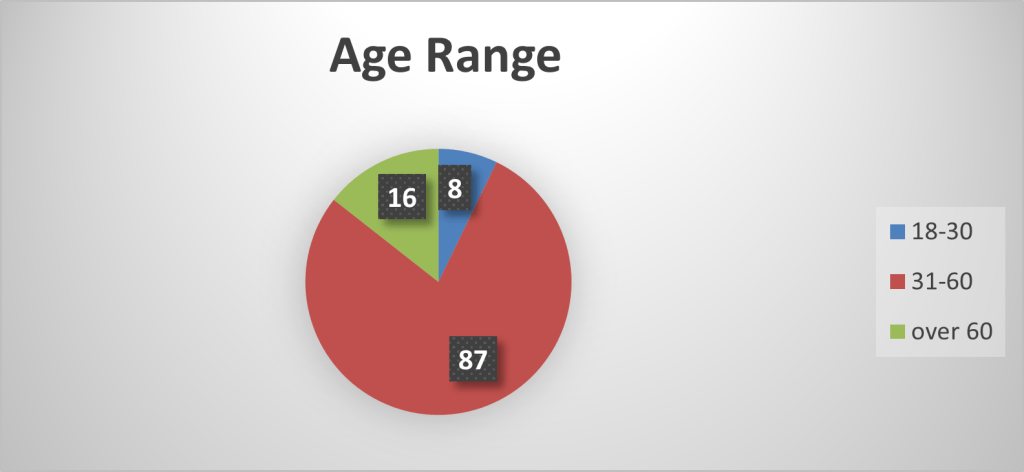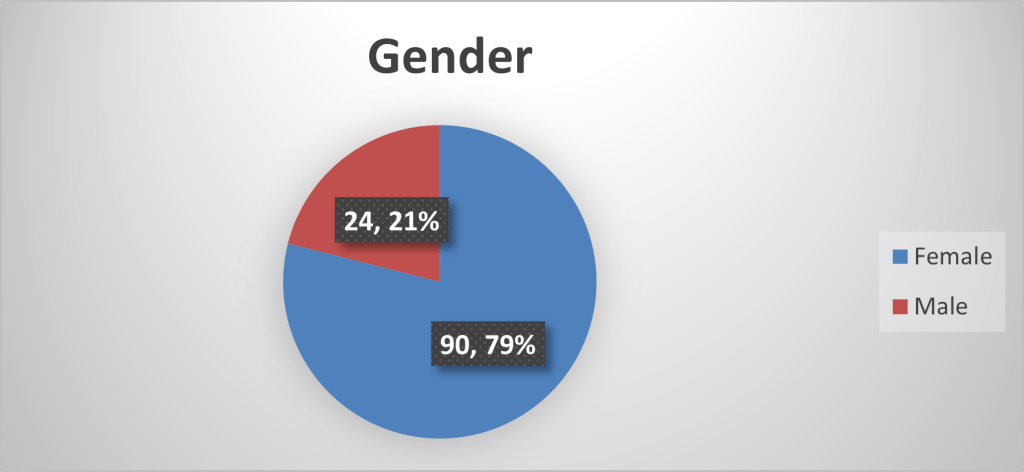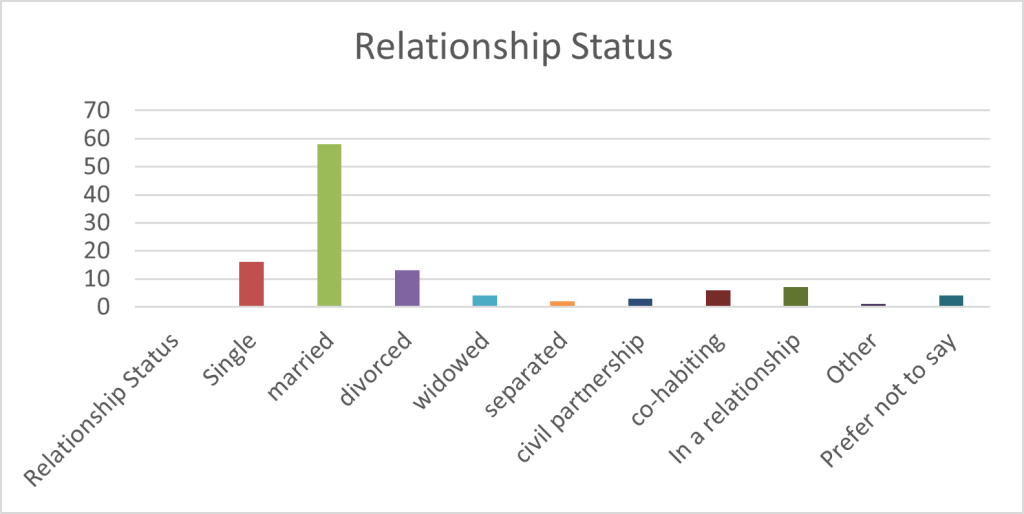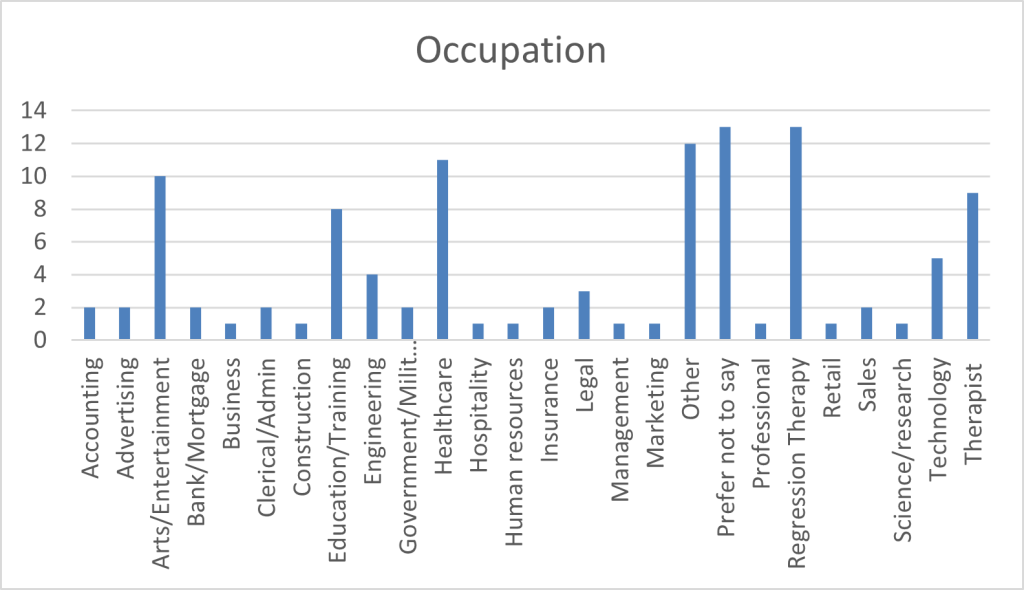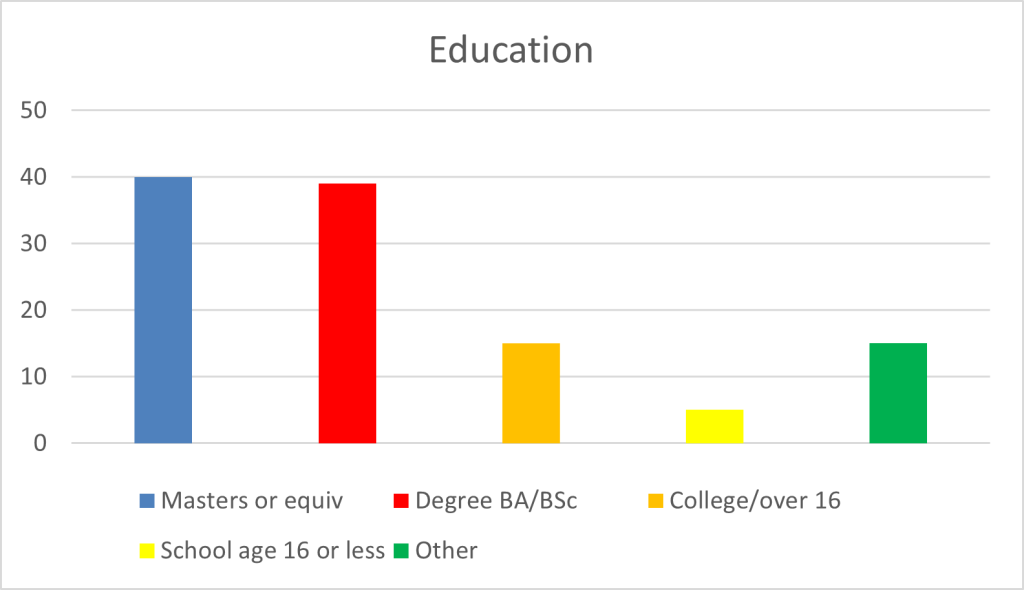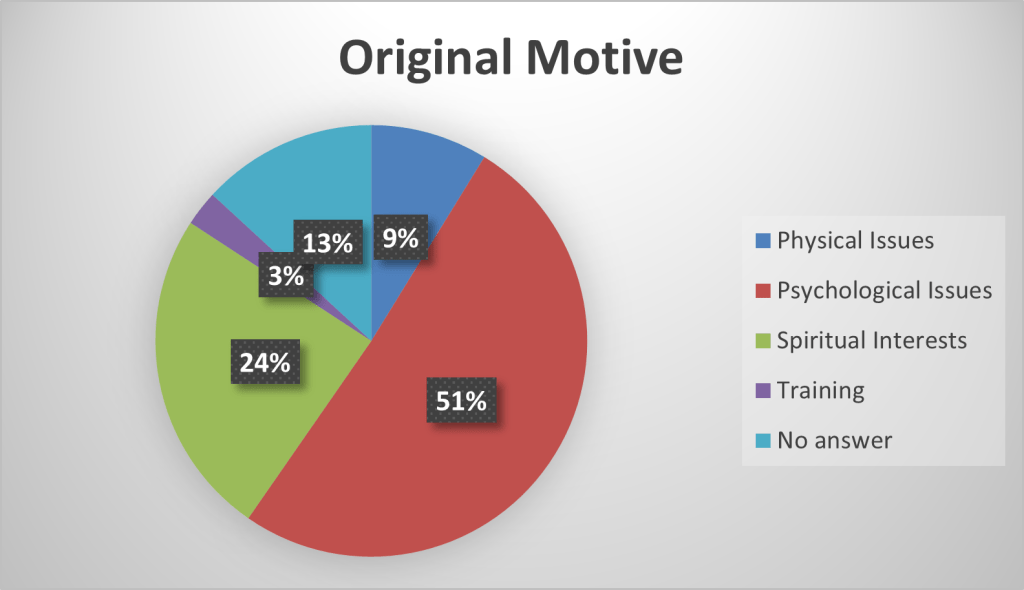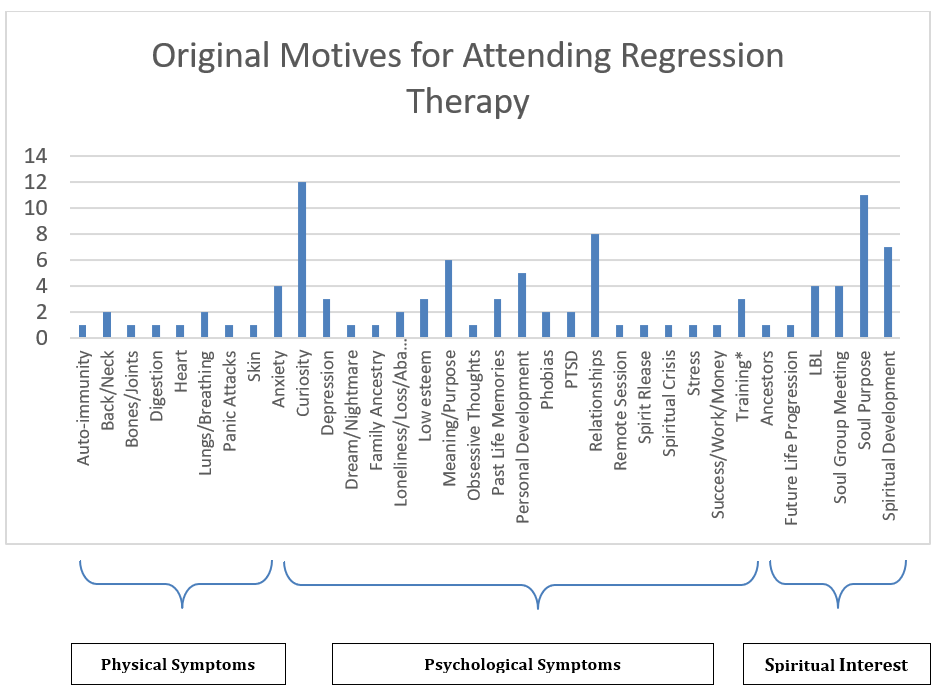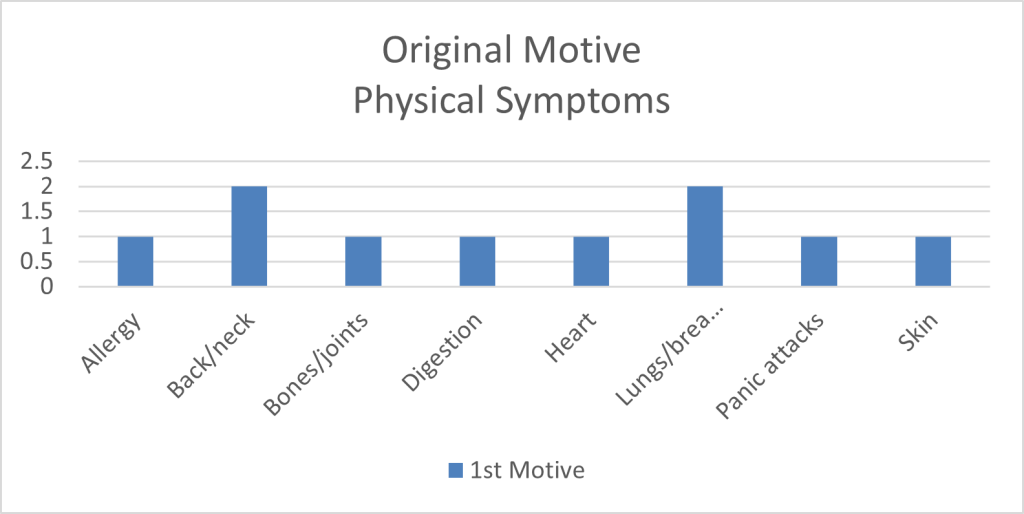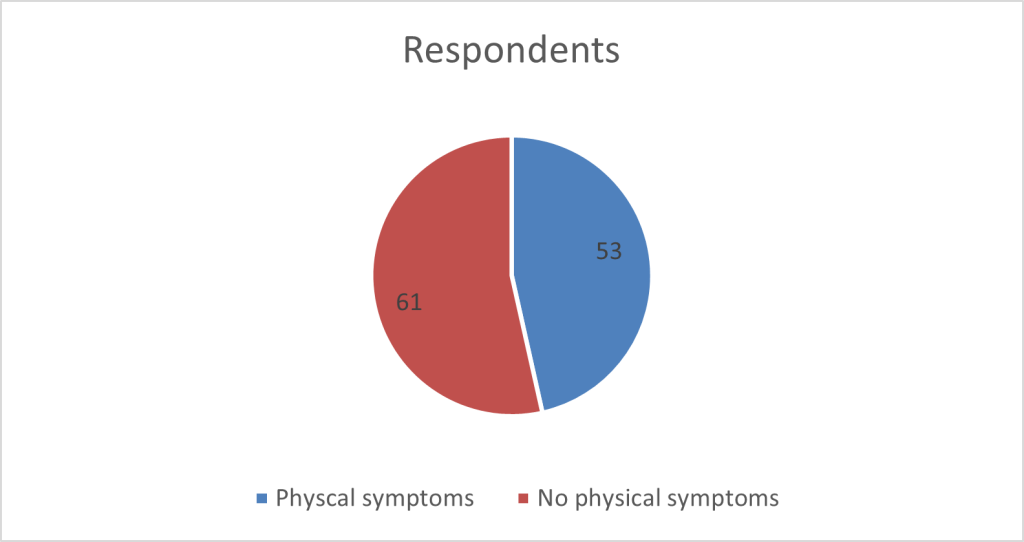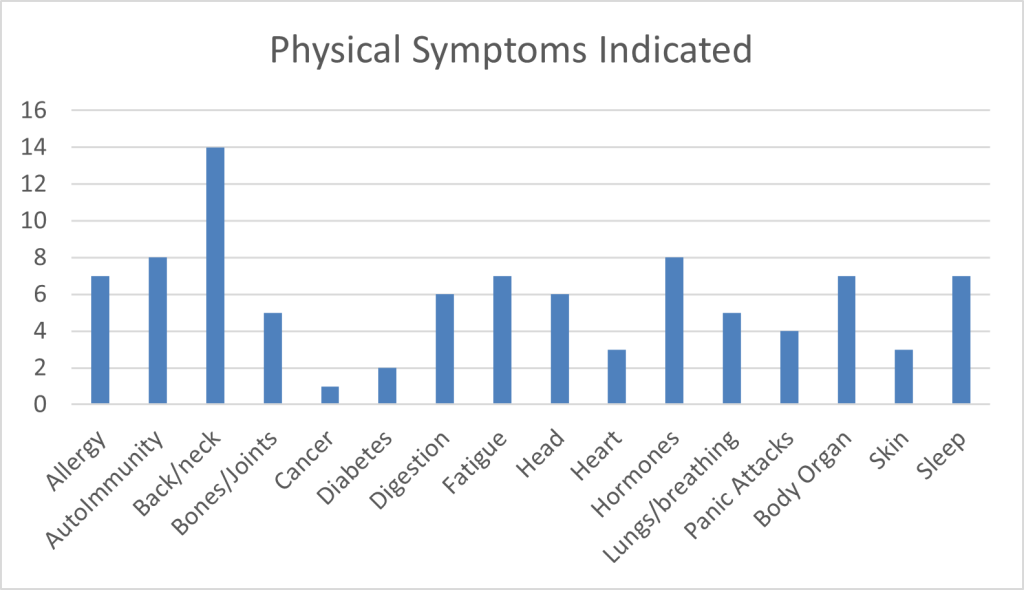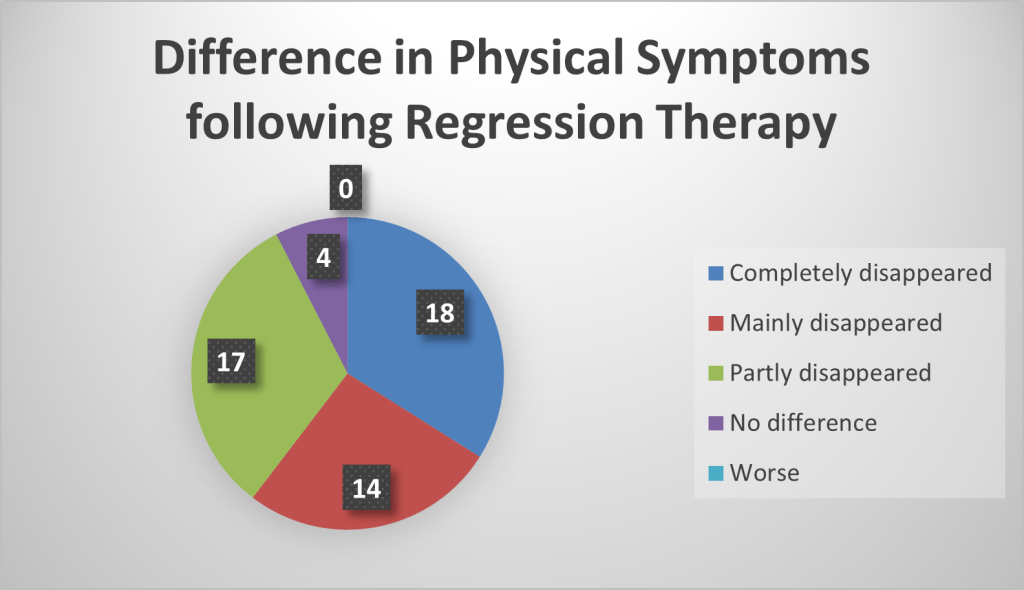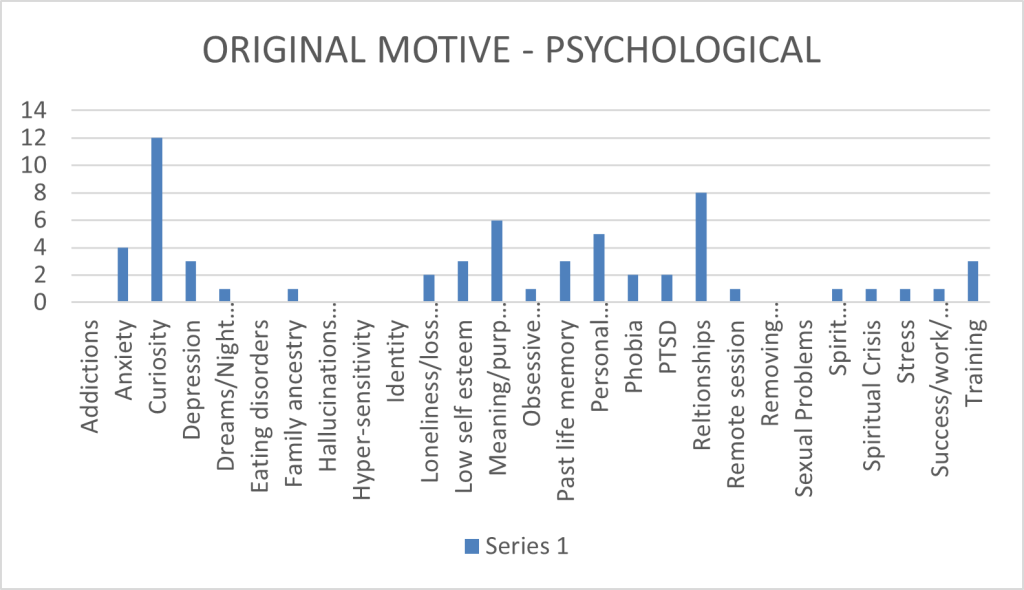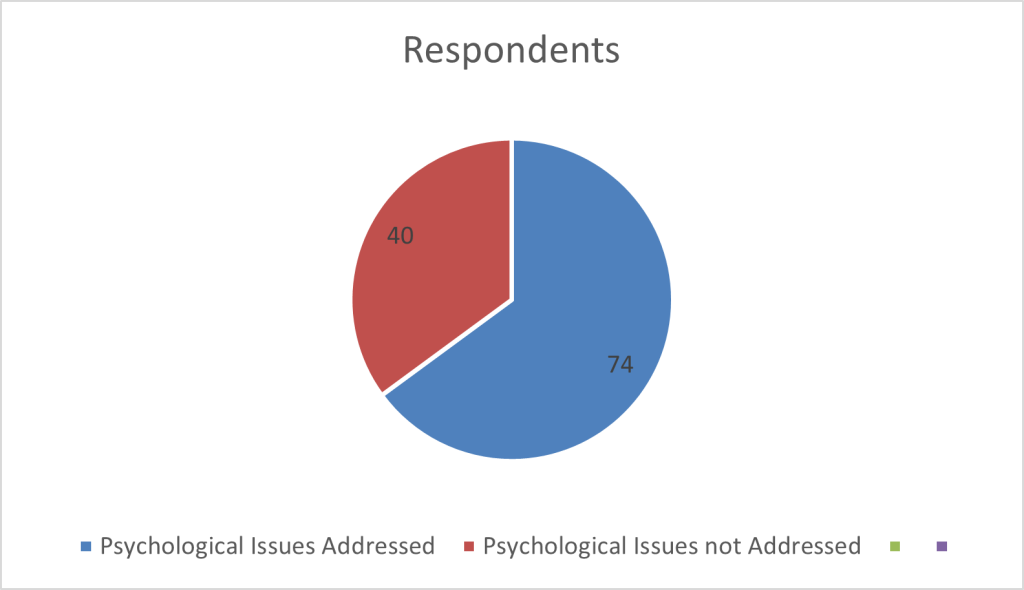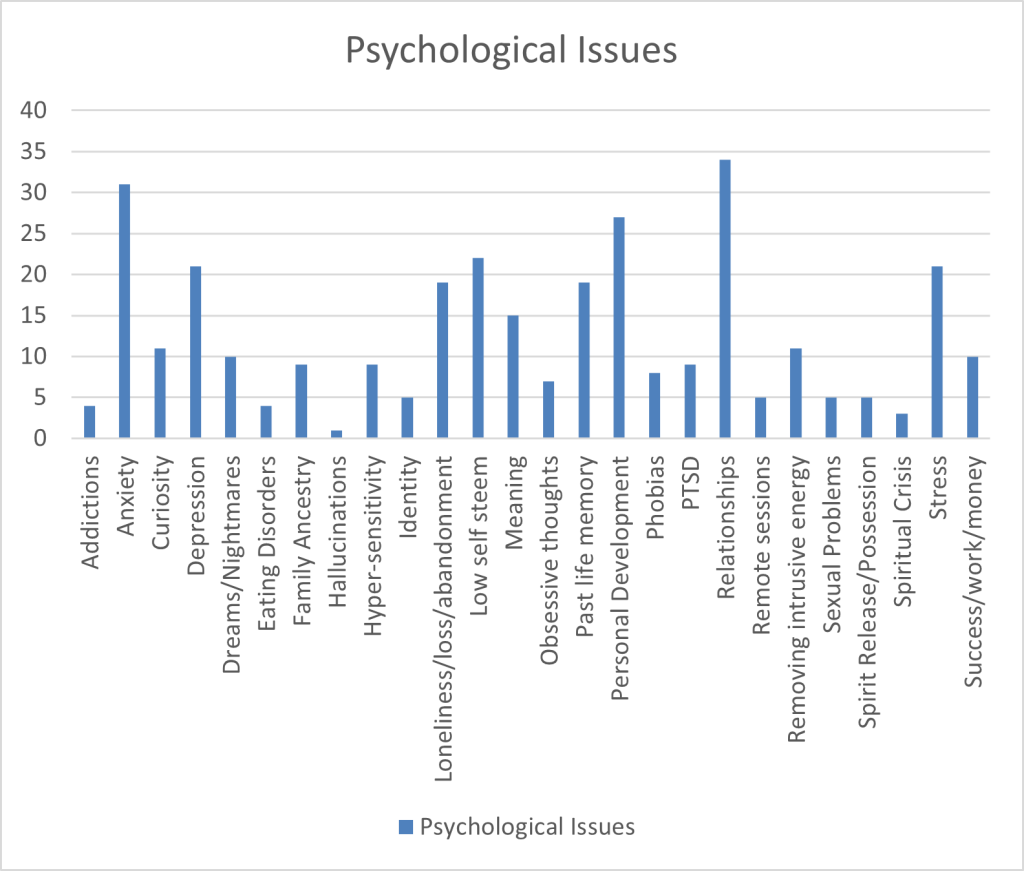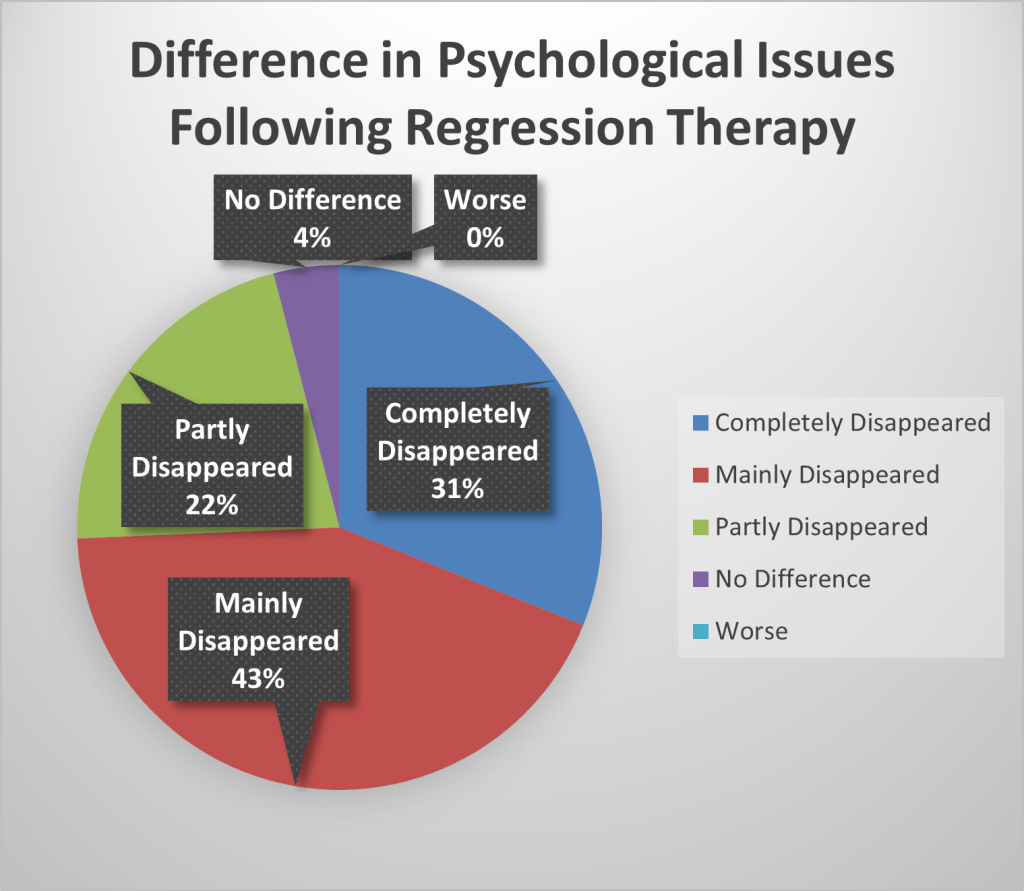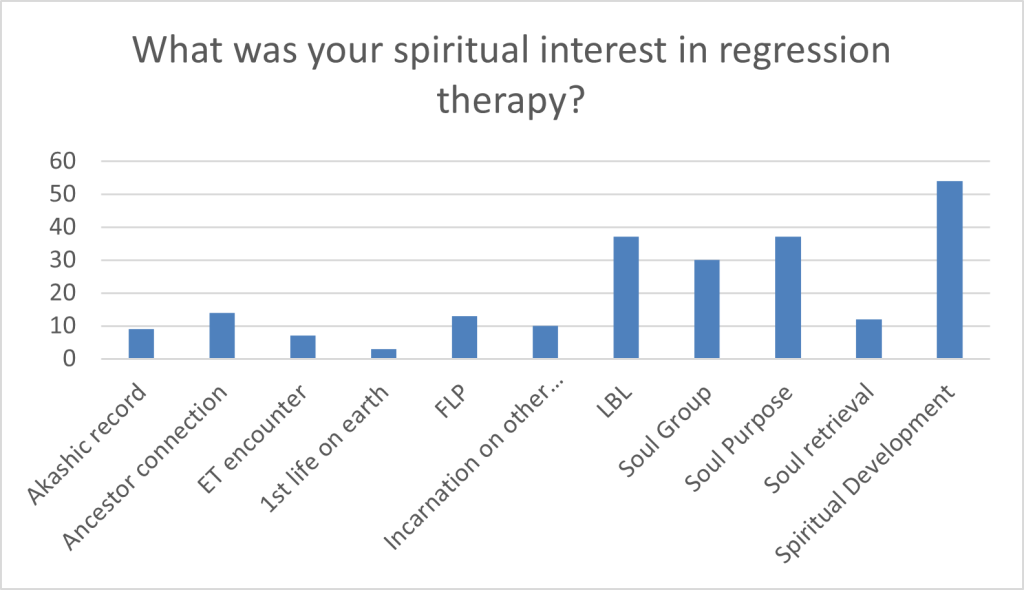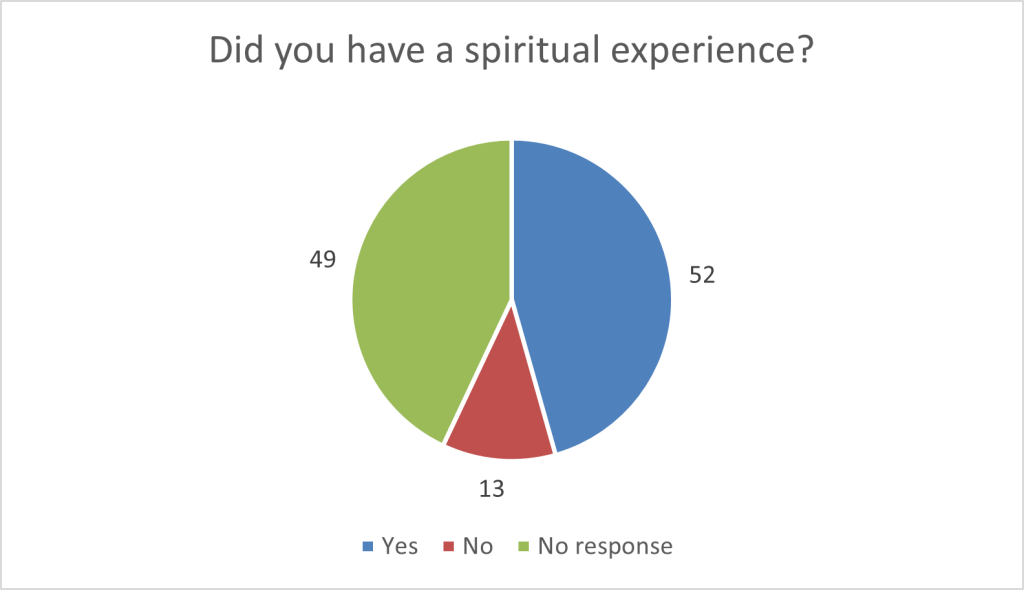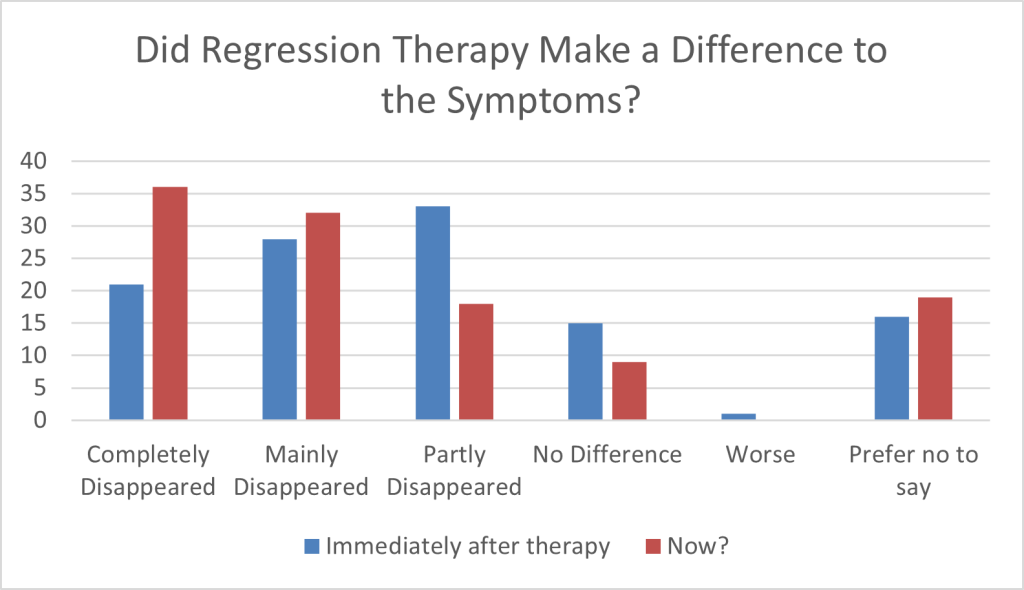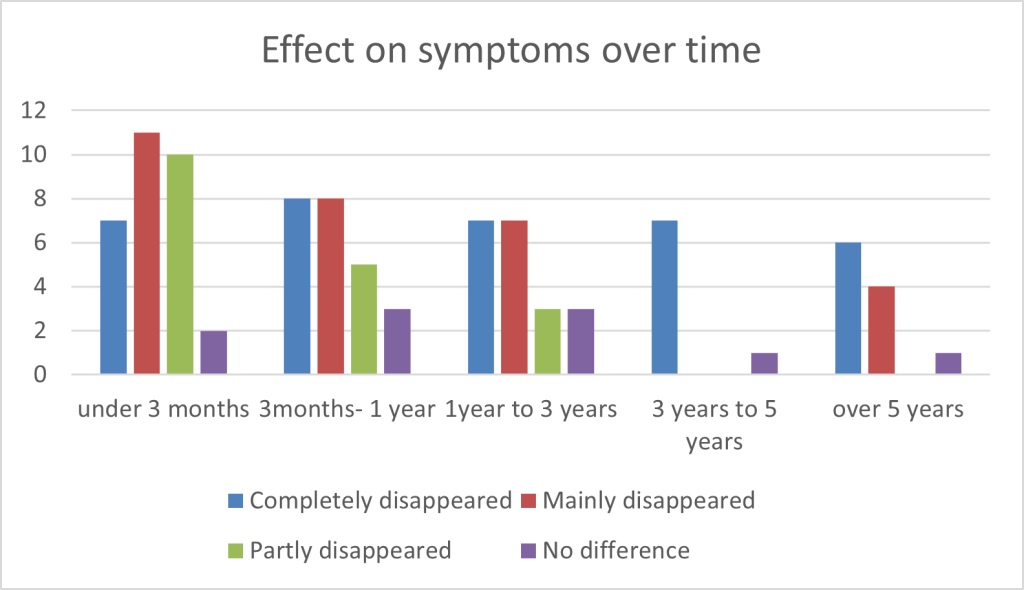 by David Graham
by David Graham
Abstract – The Client Experience Survey was a very wide based research study that sought to explore a range of effects and outcomes as a result of clients’ experiences of regression therapy. Data was collected via an on-line questionnaire and included questions about clients’ original motives for engaging in regression therapy, the benefits achieved, whether any other treatment, therapy or medication was being taken for the presenting problems or symptoms, and further basic client details including: age range, occupation, religion, marital status and education. One hundred and fourteen cases of regression therapy were collected from 29 different countries, with submissions dominantly from women (79%) compared to men (21%). Data analysis determined that 51% of survey participants’ original intentions for attending regression therapy was to attend to a psychological issue, whilst 24% sought to attend on the basis of spiritual interest, with nine percent attending for physical issues, three percent for training purposes, and thirteen percent not providing a clear response around the question of motives. A key element of the research was to establish whether clients experienced any differences immediately following and over the longer term as a consequence of regression therapy. Data analysis determined that 84% of respondents indicated ‘some’ improvement in the symptoms immediately after regression therapy, whilst 50% reported that symptoms had either ‘mainly’ or ‘completely’ disappeared. Additionally, 29% (in net terms) of respondents indicated further improvement over time following these immediate effects of regression therapy. Many personal statements, taken from submitted cases to this survey, can be found throughout this report in italics which illustrate the range and power of the clients’ experiences of regression therapy. This research was undertaken with support from the EARTh Research Committee, with the intention being to contribute to the field of regression therapy. An additional perspective being that this research may be of value to regression therapists, therapists of other disciplines, interested professionals or the general public. This report is a concise version of a larger report which can be downloaded from: https://www.earth-association.org/download-center/
Aims and Design of the Survey
The Client Experience Survey was a wide based research study that sought to explore a range of effects and outcomes experienced by clients as a result of their engagement with regression therapy. The study collected data which explored and assessed the original motives associated with clients presenting for regression therapy and if these primary motives were addressed. The research also sought to determine to what extent clients benefitted over the immediate and longer term from regression therapy.
The personal statements shared (in italics) throughout this report illustrate the range of experiences and benefits reported by clients as a consequence of regression therapy.
The research, analysis and associated reports were undertaken to contribute to the wider field of regression therapy, to collect evidence to support further research, and to generate value to regression therapists, therapists of other disciplines, interested professionals and the general public.
“I felt completely empty and bored before the sessions. Now I feel neither empty nor bored. Now I feel I am alive…” Case 51
Study Respondents and Data Collection
All of those who responded to the study had necessarily experienced regression therapy; hence it was a purposive sample. The data was collected via an on-line questionnaire which contained 39 questions. Many of the questions were answered via ‘tick boxes’ but the survey also allowed for detailed explanations and opportunities for survey respondents to describe their experiences.
Research Intentions
The survey sought to establish whether any difference was made for the client in regression therapy sessions; yet especially wanted to make that evaluation based on how the client understood their own experiences. We also wished to determine any differences in terms of the clients’ experiences immediately following therapy, and also over the longer term. Additionally, we wanted to determine the original motives behind attending regression therapy and to establish whether any other treatment, therapy or medication was being taken for the symptoms at that time.
Original Motives
Clients were able to choose between 54 different options, categorised as either physical, psychological or spiritual, relevant to their original motives for attending regression therapy. There was also a further option via an ‘Other’ box for anything not listed which also invited descriptions of the motive.
The survey addressed three different categories of motives and regression therapy experiences:
Physical Symptoms: Clients were asked whether any physical symptoms were addressed during the regression therapy sessions. Clients also had the opportunity to describe any treatment or diagnosis of those symptoms prior to the sessions and any change that may have occurred subsequent to the regression therapy sessions.
Psychological Symptoms: Clients were invited to register any psychological symptoms, any diagnosis prior to therapy and any change that may have occurred following therapy.
Spiritual Interests: Clients were asked whether their original motivations for undergoing regression therapy were spiritually orientated, and also whether spiritual experiences actually occurred for them.
The survey was not designed to establish which therapists provided the most effective service, or which training programmes provided the most effective therapists. As such, no information was collected on the therapists. Neither was the survey designed to study any past life stories.
Research Analysis
Who Responded to the Survey?
One hundred and fourteen cases of regression therapy were collected from 29 different countries. 65% of respondents were from countries that did not have English as a first language, with Turkey (at 15% of respondents), and the Netherlands (at 13% of respondents), being the leading nationalities – more than any of the English-speaking countries.
Some basic details were taken from the survey to offer an indication of the demographics and social backgrounds of the study respondents. Most respondents fell into the 31-60 age group, 79% of respondents were female and 21% were male. Interestingly, details taken relating to religious background showed that only 11% of respondents came from a mainstream religion that incorporated a belief in reincarnation i.e. Buddhist, Hindu or Sikh. Further details, regarding relationship status and occupation, can be found below in the appropriate sections of this report.
One of the remarkable statistics to emerge relating to the backgrounds of survey participants, was that 69% of respondents held a BA/BSc degree or higher.
The most likely explanation for this relates to the survey being in English language, and, as the other background details show, given that most respondents were unlikely to have English as a first language, the survey may therefore have attracted those that had undergone a higher level of education, including a familiarity with the English language.
Research Analysis – Background Details of Survey Respondents
Age and Gender
Eight 18–30-year-old · Sixteen over 60-year-old , Eighty-seven 31–60-year-old · Three undefined
Ninety Female · Twenty-four Male
Nationality
Turkey 17 · Netherlands 15 – UK 13 · USA 12 – Australia 7 · India 7 – Canada 6 · Others (from 22 different countries 37
Relationship Status
Religious Background
Occupation
Education
Research Analysis – Client Motives
Original Motive
Out of 114 submissions, 99 respondents offered a clear motive for attending regression therapy; therefore 15 submissions did not give a clear response to this particular question.
- Ten respondents (9%) original motive for attending regression therapy was to address a physical issue
- Fifty-eight respondents (51%) original motive for attending regression therapy was to address a psychological issue
- Twenty-eight respondents (24%) original motive for attending regression therapy was to address a spiritual interest
- Three respondents (3%) original motive for attending regression therapy was for training purposes
The most common prime motive for attending regression therapy was ‘Curiosity’ (12 respondents), followed closely by ‘soul purpose’ (11 respondents). Approximately 49% of respondents (48) indicated that their prime motive for attending regression therapy was for a ‘problem specific symptom’; for example, a digestive problem, anxiety or spiritual crisis. Whilst approximately 49% of respondents (48) indicated that their prime motive for attending regression therapy was not for a ‘problem specific symptom’; for example for curiosity, personal development or soul purpose. Hence there was an evenly split balance between attending for ‘problem specific symptoms’ and ‘non-problem specific symptoms’. As noted above, three people reported attending regression therapy as part of their regression therapy training.
Respondents were also invited to rank any further motives for attending regression therapy (that is second, third, fourth and fifth motive). When that was also considered, then ‘relationship issues’ ranked as the most popular motive for attending regression therapy.
However as these were secondary motives it was considered that this information was not so valuable and may simply undermine the outcome of the ‘original motive’. On that basis an evaluation of the secondary information collected was not pursued.
The chart below indicates symptoms or interests related to each original motive with additional groupings into physical symptoms, psychological symptoms and spiritual interests.
Original Motives For Attending Regression Therapy
This chart demonstrates a wide range of motives for attending regression therapy (34 different motives out of a possible 54 possible options were selected). The motives indicated in the survey do not just come from clients that have a ‘perceived problem’ needing attention from a therapist, they also include clients that simply feel curious, may wish to enhance their life through personal development or explore a spiritual motive. Even in those cases it appears that there are many instances of personal issues being addressed in regression therapy, whether those issues align with their original motive or not. In those cases regression therapy made a difference for a physical or psychological symptom even though that was not the intention for the sessions. There are a few cases where the original motive is left untouched yet other beneficial differences occurred as comments from the following case show:
“Phobias have mostly gone away. The phobia that I saw the therapist for treatment (needles) remains, however strangely other phobias have completely gone away e.g. spiders” Case 111
Update to Case 111: The therapist reports an incidental meeting with the client, where it was explained that the phobia of needles has also disappeared, yet this had simply not been tested out at the time of submission for the survey.
The ‘symptoms’ described are not always those expressed as the ‘original motive’ for attending regression therapy. In some cases that clearly is the original motive, yet in other cases it is much less clear or it is obviously not so. For example there are other cases where a client has attended regression therapy to address a simple curiosity or for a spiritual motive, yet a physical symptom has cleared up or a depression has disappeared following the sessions.
- The survey did not find evidence that eliminates any motive for suitability for regression therapy, even though there may well be unsuitable motives.
- The survey did not find evidence to suggest that regression therapy does not work on any particular issue even though there may be unsuitable issues.
- This may mean that there is simply insufficient data from this survey to offer any indications on those aspects.
Research Analysis – Physical Symptoms
Out of 114 submissions, 10 (10.4%) out of 96 responses to this question indicated that their original motive for attending regression therapy was to address a physical symptom. As the graph shows, the motives of those ten clients was for regression therapy to address a disparate spread of eight different physical symptoms. Back/neck/spine and lungs/breathing indicated twice each, with six other categories indicated once only.
Out of 114 respondents, 53 (46%) indicated that at least one physical issue was addressed in regression therapy whether this was part of their original motive or not.
As the chart below indicates, physical symptoms were listed 93 times by those 53 respondents. Survey respondents were able to select up to 16 different broad physical issues (and also had an option to select any unlisted issues via an ‘Other’ box). Each of those 16 options was selected at least once. The most common physical issue addressed by regression therapy (significantly higher than the other options and indicated 14 times), was a condition effecting the ‘back/neck/spine’. The least common physical issue was ‘cancer/tumours’ with one selection.
Forty-nine (92%) of those 53 clients indicated that a difference was made to the physical symptoms, a quote from a suitable case is offered below:
“Headaches totally went as did stomach pain after several days….” Case 67
Data Analysis – Physical Symptoms – Further Outcomes of Regression Therapy
The data analysis, as evidenced in the chart below, generated the following findings:
- Out of 53 respondents 18 (34%) indicated that physical symptoms have COMPLETELY DISAPPEARED
- Out of 53 respondents 14 (26%) indicated that physical symptoms have MAINLY DISAPPEARED
- Out of 53 respondents 17 (32%) indicated that physical symptoms have PARTLY DISAPPEARED
- Out of 53 respondents 4 (8%) indicated that physical symptoms showed NO DIFFERENCE
- No respondents indicated that physical symptoms have BECOME WORSE
Case Study of Regression Therapy Applied to a Physical Issue No 1
Case 36: Many cases report that a change at the physical level also demonstrates a change at the psychological level, yet in this case the client stays with the physical change alone. Note that it was ‘personal development’ that attracted him to regression therapy and although he gives limited details and a limited description of his experience in regression therapy (English was not his first language) the outcome was remarkable. In particular the length of time since the session indicates that the change in osteochondrosis may well be permanent and as he points out, ‘completely disappeared’. He also specifies that there were no other treatments around that time. This is a powerful case that a client has submitted more than fifteen years after a single session, he clearly holds regression therapy as being responsible for this change.
Physical Symptoms: “Osteochondrosis”
Any Change: Completely Disappeared
Comments: “For fifteen years after RT session, symptoms do not recur.”
Here are some further basic details as supplied by the client:
| Case No. | 36 |
| Gender | Male |
| Age Group | Over 60 years old |
| Nationality | |
| Religion | Orthodox |
| Occupation | Healthcare |
| Education | Other |
| Relationship status | Married |
| Date of submission | 21/9/2014 |
| Original Motive | Personal Development |
| Physical Area Effected | Bones/joints |
| Any Difference to Physical Symptoms? | Completely Disappeared |
| Any Other Treatments? | None indicated |
| Immediate overall difference? | Completely disappeared |
| Overall difference now? | Completely disappeared |
| How long did therapy last? | |
| How many sessions? | 1 |
| How long ago? | Over 15 years earlier |
Case Study of Regression Therapy Applied to a Physical Issue No 2
Case 12: In this case, an extra feature of regression therapy was shown in the clients’ original motive; that is to be a proxy volunteer to enable healing for another person. This is another potential of regression therapy where a person that is connected to the client can work as a proxy substitute for a client that is unable to attend or engage in therapy, for example an immobile or a non-verbal person. The proxy work appeared to succeed and she then returned to address her own physical, psychological and spiritual needs. The client also refers to the removal of intrusive energy as part of the therapy and how it contributes to the change in her. A positive outcome in each of those spheres is a characteristic of this therapy as it appears to be common for regression therapy to bring about change at different levels and in different ways. The physical change is highlighted here as a remarkable aspect of this case, yet the stress and proxy session are also remarkable and appeared to work. See below:
Physical Symptoms: “I had been diagnosed with psoriasis many years ago.”
Physical Change: Completely Disappeared
Comments: “My skin became clear without any further lesions very soon after my visit to the regression therapist.”
Further Comments: “Following the therapy session to facilitate the progression of the soul of another person the “feedback” was very positive. Secondly, stress and the removal of
intrusive energy were greatly relieved and removed following treatment.”
Psychological Change: Symptoms Completely Disappeared
Comments: “The therapy was completely successful.”
Any Spiritual Experience: Yes
Comments: “I was aware of the presence of beings from another place not on earth which gave me great peace and reassurance.”
Here are some further basic details as supplied by the client:
| Gender | Female | Physical Area Effected | Skin |
| Age Group | Over 60 years old | Any Difference to Physical Symptoms? | Completely Disappeared |
| Nationality | UK | Psychological Symptoms | Remote session for other person, Removing Intrusive Energy, Personal Development, Stress |
| Religion | Protestant | Any Difference to Psychological Symptoms? | Completely Disappeared |
| Occupation | — | Any Other Treatments? | Ointment via doctor |
| Education | College | Immediate overall difference? | Completely disappeared |
| Relationship Status | Divorced | Overall difference now? | Completely disappeared |
| Original Motive | Proxy session | How many sessions? | Two – five sessions |
| How long ago? | One to three years earlier | How long was therapy? | Three months to one year |
Research Analysis – Psychological Symptoms
Out of 114 submissions, 58 (60%) out of 96 responses to this question indicated that their original motive for attending regression therapy was for a psychological reason. *Please note that ‘psychological reason’ also includes non-problematic motives such as curiosity or personal development.
Respondents to the survey were able to select up to 26 different broad psychological issues to explain their original motive for attending regression therapy. As the graph shows, curiosity scored 12 and was the most common selection. Respondents also had a further option of choosing a different motive other than the ones listed. Three of those chose ‘training’ as their original motive.
Of 114 respondents, 74 (65%) indicated that psychological issues were addressed in regression therapy whether this was part of their original motive or not.
Those 74 respondents indicated that 314 psychological issues were addressed in regression therapy and as the chart below shows, the most common psychological issue addressed by regression therapy was classed as ‘relationships’. This was indicated 34 times by respondents, just higher than anxiety. The least common applied to ‘hallucinations’ with one indication.
Seventy-one (96%) out of those 74 respondents to this question indicated that some difference was made to psychological issues, a quote from a suitable case is offered below:
“I was able to make the links between the symptoms of anxiety and abandonment and the problems completely disappeared….. it is like the meaning just keeps deepening. It was a transformational experience.” Case 65
Data Analysis – Psychological Conditions – Further Outcomes of Regression Therapy
The data analysis, as evidenced in the chart below, generated the following findings:
- Out of 74 respondents 23 (31%) indicated that psychological symptoms have COMPLETELY DISAPPEARED
- Out of 74 respondents 32 (43%) indicated that psychological symptoms have MAINLY DISAPPEARED
- Out of 74 respondents 16 (22%) indicated that psychological symptoms have PARTLY DISAPPEARED
- Out of 74 respondents 3 (4%) indicated that psychological symptoms showed NO DIFFERENCE
- No respondents indicated that psychological symptoms have BECOME WORSE
Case Study of Regression Therapy Applied to a Psychological Issue No 1
Case 10: In this case the client describes the psychological issue, the catharsis during the therapy session, and the difference that it made for her. Also notice that she described the symptoms as ‘completely disappeared’ immediately after therapy, yet ‘mainly disappeared’ more than a year later. This is contrary to the pattern in many other cases.
Psychological Symptom: “Was feeling that I must be perfect in all matters in life, felt depression and guilt that I wasn’t enough.”
Psychological Change: Mainly disappeared
Comments: “I was dealing with a decision I made when I was three. My mom wasn’t satisfied with me and I made a decision to be always good child=perfect one as mom expected. When I had contact with this feeling of fear and rage during my therapy session, I released these feelings by crying, shouting and kicking and beating pillows :-) after releasing these feelings, I accepted my humanity – my right to make mistakes and learn from that. I’m more complete now and more balanced.”
Immediate Overall Difference: Completely Disappeared
Comments: “I had very good feeling afterwards, I felt catharsis during and after session indeed, very liberating experience :-)”
Any Difference Now: Mainly Disappeared
Comments: “Sometimes the old “program” starts auto-matically, then I’m more aware about it and can transform my bad feelings into good ones.”
Here are some further basic details as supplied by the client:
| Gender | Female |
| Age Group | 31-60 years old |
| Nationality | |
| Religion | N/A |
| Occupation | Healthcare |
| Education | BA/BSc |
| Relationship status | Divorced |
| Psychological Symptoms | Anxiety, Depression, Family Ancestry, Low Self Esteem |
| Any Difference to Psychological Symptoms? | Completely Disappeared |
| Any Other Treatments? | None |
| Immediate overall difference? | Completely disappeared |
| Overall difference now? | Mainly disappeared |
| How many sessions? | One |
| How long ago? | One to three years earlier |
Case Study of Regression Therapy Applied to a Psychological Issue No 2
Case 14: In this case, it was low self-esteem that attracted the client to the regression therapist. Note how a difference is reported at both the physical and psychological levels.
Original Motive: Low self esteem
Physical Symptoms: “Stress symptoms, exhaustion syndrome, cognitive failures with memory weakness, reading comprehension, inability to concentrate, extreme fatigue, difficulty falling asleep and disturbed sleep patterns, sound and light sensitive.”
Psychological Symptoms: “Lack of self-esteem manifesting as feeling of utter disgust in presence of self mainly upon waking in the morning. It was a very difficult feeling to handle as it arose in a very “naked” time when I was just waking up to a new day. Difficulty upholding own boundaries and respecting own needs.”
Any Physical Change: Symptoms Partly Disappeared
Comments: “A very positive process was initiated and has been ongoing since. It happens gradually. The improvements are tangible.”
Any Psychological Change: Symptoms Mainly Disappeared
Comments: “It has become so much better. I have started recognising when I am about to follow an old track in my mind and have the ability to choose a different route! I am still slow at detecting when there’s boundaries and needs issues that I have to deal with but I am practising and getting better at it every day. It is a gradual thing listening to and understanding the signals from the body and the soul.”
Spiritual Experience: “Yes my guides helped me throughout the experience and I am so very happy to be backed by such a great spiritual team.”
Any Treatments: “I was using sedative medication for sleeplessness, took antidepressants and had a bi-weekly contact with a psychologist. I completely stopped using all medications two months after the regression sessions. I phased them out slowly as to avoid any withdrawal symptoms.”
Any Difference Now: “Still improving day by day. My frame of reference is of course different, it’s hard to even remember how dark everything seemed before I did the sessions.”
Further Comments: “I am no longer afraid of dying. I have a sense of who I really am at my core. I am so very, very grateful for the greater perspective I have gathered on my life here on earth. I am much more humble knowing that all of us – all – are souls here in bodies with challenges and important tasks to fulfil. I choose love over fear.”
Here are some further basic details as supplied by the client:
| Gender | Female | Physical Symptoms | Sleep issues |
| Age Group | 31-60 years old | Any Difference? | Partly Disappeared |
| Nationality | Psychological Symptoms | Low Self Esteem, PL Memories, Personal Development, Stress | |
| Religion | Protestant | Any Difference? | Mainly Disappeared |
| Occupation | Banking | Immediate Difference? | Mainly Disappeared |
| Education | Masters | Difference Now? | Mainly Disappeared |
| Relationship status | Married | How many sessions? | Two -five sessions |
| How long ago? | One to three years earlier |
Research Analysis – Spiritual Interests
Out of 114 submissions, 28 (29%) out of 96 respondents to this question indicated that their original motive for attending regression therapy was to address a spiritual interest. As the graph below shows, seeking a ‘soul purpose’ rated most highly, followed by ‘spiritual development’.
As evidenced in the chart below, spiritual aspects were indicated a total of 226 times. Given that 80 (70%) of respondents out of 114 indicated that a spiritual interest was addressed in their regression therapy, this averages at 2.8 spiritual aspects mentioned for each person. ‘Spiritual development’ was mentioned most often as a spiritual aspect that was addressed by attending regression therapy. Whilst ‘soul purpose’ and ‘life between life (LBL)’ ranked jointly second. Exploring a first life on earth ranked as the least common spiritual interest.
Out of 114 respondents, 52 (46%) indicated that they had a spiritual experience associated with their regression therapy, whilst 13 (11%) said they did not. 49 (43%) did not respond to this question.
Case Study of Regression Therapy Relating to Spiritual Experiences No 1
Case 79: A spiritual curiosity to explore our soul journey can result in remarkable and powerful results for some. In this case a serious physical injury showed remarkable improvement, along with the corresponding psychological issue and spiritual experience as explained by the client.
Physical Symptoms: “Vertebra in neck messed up from car accident… encroachment and some dis-integration and fusion after YEARS of pain, migraines and lack of mobility.”
Any Change: Completely Disappeared
Comments: “Seeing that I was pushed down stairs that broke my neck… causing death in a past life… and the REASONS behind that event… helped me to understand that my inability to speak up for myself in THIS life was an ongoing lesson that manifested in car accident/ injuries. After that understanding took place ‘somebody’ from the other side focused a beam of red light into my neck area for five minutes. Every bit of the problem was gone after that. It has never come back! As if it never even was! Which amazed me totally! And I tested out the movement and lack of pain for a week before I really believed it myself!”
Psychological Symptoms: “Helpless rage.”
Any Change: Mainly Disappeared
Comments: “To see the bigger picture in a clear and objective way. MY part in it too… without any attachment or judgment… gave me opportunity to just let it go.”
Any Spiritual Experience: “Not sure what the definition of ‘spiritual’ is… but being aware that I was in another realm… that it was very REAL and vibrant and alive allowed me to bring that experience in to the everyday earth experience… as if a doorway was opened.”
Other Treatments: “I had tried acupuncture for my neck and lower back pain; it helped somewhat but was not permanent. I also tried Reiki (and took classes for this too) which helped in a more permanent way… but did not eliminate the psychology behind the physical manifestations.”
Immediate Overall Difference: Symptoms Mainly Disappeared
Comments: “Understanding how the false ideas about life (from all points of view including others) had manifested into the physical experience… which then allowed me to let it all go.. That I no longer NEEDED that physical manifestation because I understood the lesson.”
Any Difference Now: Symptoms Completely Disappeared
Comments: “YAY for finally having the courage and unyielding intent in this lifetime to address my own crap. Happy, healthy and accepting of whatever ‘life’ throws at me! It’s ALL good now; even when it isn’t! I laugh much more now and do not take everything so seriously… as if I had been single-handedly holding the world together. Hahahaha It all seems so silly to me now. In hind- sight life was a lot easier than I thought it was at the time… and that new attitude carried over into now.”
Here are some further basic details as supplied by the client:
| Gender | Female |
| Age Group | Over 60 years old |
| Nationality | USA |
| Religion | Other |
| Occupation | Other |
| Education | School age 16 |
| Relationship status | Single |
| Original Motive | Curiosity |
| Spiritual Interests | LBL, Soul Group Connection, Soul Purpose Discovery |
| Immediate overall difference? | Mainly disappeared |
| Overall difference now? | Mainly disappeared |
| How many sessions? | Two – five |
| How long in therapy? | Three months to one year |
| How long ago? | Three to five years earlier |
Further Narrative Data Relating to Spiritual Experiences During Regression Therapy
Here are further pieces of feedback from participants in the study which express in their own words the spiritual aspects that can be found in regression therapy:
Case 70: “You cannot explain the joy you feel. Feelings are intense. You become one with everything. Everything is easy nothing is difficult. Love above all…. Things or issues don’t seem to bother me like they used to. Not afraid to die. Everything is a choice.”
Case 72: “I feel whole. Accepting of life. KNOWING that it is all good. Literally-ALL GOOD.”
Case 47: “I feel like I got answered many questions even though I am not conscious of any of them. Like a serene satisfaction beyond words.”
Research Analysis – Was There an Immediate Difference Following Regression Therapy?
One of the questions in the survey asked if there an immediate difference following regression therapy, and in most cases the answer was ‘Yes’. In fact, the survey demonstrated that the vast majority of respondents (84%) experienced at least some immediate improvement in symptoms.
Data Analysis – Did Any Difference in Symptoms Emerge or Change Over Time?
The survey asked if there was any difference ‘now’ (at the point of completing the survey). In some cases this could be any time ranging from a few weeks following the end of therapy, to more than ten years later. This information could then be compared to the reported effects of regression therapy immediately following the end of the sessions.
Sixty-one percent reported the same outcome at the time of completing the form compared to the outcome that was reported immediately following therapy (For example: a report that the symptoms had ‘mainly disappeared’ immediately following a session remains as ‘mainly disappeared’ at the time of completing the survey).
Thirty-four percent reported further improvement at the time of completing the form compared to the immediate outcome after therapy (For example: a report that the symptoms had ‘mainly disappeared’ immediately following a session may have improved to ‘completely disappeared’ at the time of completing the survey).
Five percent reported a deterioration in any improvement at the time of completing the form compared to the immediate outcome after therapy (For example: a report that the symptoms had ‘mainly disappeared’ immediately following a session may have decreased to ‘partly disappeared’ at the time of completing the survey).
In net terms 29% of respondents indicated further improvement over time following the immediate effects of regression therapy.
In short, most respondents indicated a ‘sustained’ improvement in symptoms over time, while about half as many recorded an ‘increased’ improvement. A small number indicated a deterioration in the effects of regression therapy over time.
As is evidenced in the chart above:
- Out of 99 respondents to this question 49 (50%) indicated that the symptoms had either ‘mainly’ or ‘completely’ disappeared immediately after regression therapy
- Out of 99 respondents to this question 68 (69%) indicated that the symptoms had ‘mainly’ or ‘completely’ disappeared ‘now’ i.e. at the time of submitting the survey
- One respondent indicated that symptoms had become ‘worse’, and the rest indicated ‘no difference’.
This demonstrates that beyond the immediate reaction, the effects of the therapy improves for a significant number of clients (net total of 19) by the time that the online submission was made (49 has increased to 68).
Exploring possible reasons for this can be interesting; for some clients it may be that regression therapy triggers an internal change that continues to unfold for a period of time following the sessions, the change playing out in daily life and growing during that time. However we acknowledge the possibility of further treatments after the sessions that may have contributed to improvements, although the clients clearly attribute improvements to the sessions of regression therapy.
In Case 67: The immediate reaction was that the symptoms actually became worse, as the client was “confronted with the phobia itself” yet the symptom was completely cleared by the time of submitting the form less than three months later, stating that it “seems like an irrational fear now.”
The survey does not ensure that all of the listed symptoms as supplied by the client on the form have changed. If not all symptoms, then which ones? We depend on the clients’ comments to understand that, on some occasions the answer is clear yet on other occasions it is not clear.
Data Analysis – Did Any Difference in Symptoms Emerge or Change Over Time – How Long Ago?
Out of 114 submissions, 93 respondents indicated how long ago the regression therapy ended, in relation to the point of completing the survey.
- Thirty respondents indicated that the regression therapy ended less than three months ago
- Twenty-four respondents indicated that regression therapy ended between three months and one year ago
- Twenty respondents indicated that regression therapy ended between one and three years ago
- Eight respondents indicated that regression therapy ended between three and five years ago
- Eleven respondents indicated that the regression therapy ended over five years ago
- Twenty-one did not answer
The study then examined how effective the therapy was judged to be by respondents according to how long ago the sessions were ended.
In those cases where therapy had only ended up to three months earlier, 60% of respondents indicated that symptoms had either ‘mainly’ or ‘completely’ disappeared.
Note how the chart shows that the symptoms in the majority of cases were regarded as either completely disappeared (blue) or mainly disappeared (orange), right from the most recent cases where therapy ended less than three months earlier and then becoming more clearly so for the older cases. Yet the symptoms that were partly disappeared diminishes over time, many of them being regarded as either mainly or completely resolved as time moves on. Even so this may simply indicate that those clients that really felt a difference are the ones that have submitted entries to this survey.
Case Study of Regression Therapy Where an Improvement in Symptoms Continues Beyond the End of Therapy No 1
Case 100: Physical issues and psychological issues are often addressed together, as demonstrated in this case of only one session. This case also demonstrates how the overall issues that were regarded as ‘mainly disappeared’ immediately following the session, became ‘completely disappeared’ at the time of the submission up to 3 months later. The client reaction to a single session speaks for itself. See details from the client submission below:
Physical Symptoms: “Stomach pains. Headaches daily.”
Any Change: Completely Disappeared
Comments: “Awesome! Very pleased.”
Psychological Symptoms: “Anger. Frustration. Violent feelings.”
Any Change: Mainly disappeared
Comments: “It’s a work in progress, but much alleviated.”
Immediate Overall Difference: Mainly Disappeared
Comments: “Headaches totally went as did stomach pain, but after several days.”
Overall Difference Now: Completely disappeared
Comments: “Lot calmer. More connected to spirit. More reasonable. Less aggressive. Happy to let things go.”
Here are some further basic details as supplied by the client:
| Case No. | 100 | Physical Area Effected | Back/spine/neck pain, Diabetes, Digestion, headaches/migraineSkin problems, fatigue |
| Gender | Female | Any Difference to Physical Symptoms? | Completely Disappeared |
| Age Group | 31-60 years old | Psychological Symptoms | Anxiety; Depression; Obsessive Thoughts; Relationship Issues |
| Religion | Catholic | Any Other Treatments? | None |
| Education | BA/BSc | Immediate overall difference? | Mainly disappeared |
| Relationship status | Married | Overall difference now? | Completely disappeared |
| Date of submission | 12/04/2015 | How many sessions? | One |
| Original Motive | Depression | How long ago? | Up to three months earlier |
Case Study of Regression Therapy Where an Improvement in Symptoms Continues Beyond the End of Therapy No 2
Case 63: This case focusses on the physical issue only. There were multiple sessions that took a year for the symptoms to completely disappear, yet that difference is still apparent more than five years later. This does not only show how regression therapy contributes to a healing process that continues following the end of therapy, it also demonstrates how the change can remain in the longer term.
Physical Symptoms: Rheumatism
Any Change: Completely Disappeared
Comments: “After a half year the symptoms partly disappeared and after one year totally.”
Overall Difference Now: “A great difference. I don’t have some fears any more. I don’t take any medicine anymore for my rheumatism, not for years now.”
The client also reported a spiritual experience emerged from the sessions and offered this comment:
“During my sessions I see things that I had not seen before during the day or night. This experience gives me more self-esteem and told me that I’m not crazy.” Case 63
Here are some further basic details as supplied by the client:
| Case No. | 63 | Physical Area Effected | Bones/joints |
| Gender | Female | Any Difference to Physical Symptoms? | Completely Disappeared |
| Age Group | 31-60 years old | Any Other Treatments? | Medicines for rheumatism |
| Nationality | Netherlands | Immediate overall difference? | Mainly disappeared |
| Religion | Catholic | Overall difference now? | Completely disappeared |
| Occupation | Healthcare | How long did therapy last? | One year |
| Education | BA/BSc | How many sessions? | Ten |
| Relationship status | Married | How long ago? | Over five years earlier |
| Original Motive | Auto-immune system |
Research Analysis – What About Clients That Indicated ‘No Difference’ Regarding Regression Therapy?
A small number of clients indicated that regression therapy offered no difference to their symptoms, whether that was the original motive or not.
- Two of those clients attended for physical issues, one was for ‘sweating’, another for ‘obesity’.
- Two of those clients attended for psychological issues, one was for ‘anxiety’ and another was for ‘stress’.
However there are other cases where regression therapy does address those same issues, thus there is no evidence to support the exclusion or inclusion of any particular issue for regression therapy. In any case the numbers are just too small to draw any conclusions in this regard.
Another small number indicated ‘no difference’ when they attended regression therapy for spiritual interests, yet many of those also point out that they had no symptoms that they were seeking to change as their focus was on spiritual interests.
Research Analysis – What Other Factors May Have Influenced This Study?
Respondents were asked about any other treatments or medication that was used at the time of the sessions:
- Twenty-one indicated medication of some form around that time
- Eighteen indicated another therapy of some kind around that time
- Fifteen indicated some other form of treatment around that time
- Forty-two (37%) indicated at least one medication/therapy/treatment around that time
- Seventy-two (63%) indicated no medication/therapy/treatment around that time
Another possibility is that a client may have had further treatment since the end of regression therapy, yet before commenting on the state of the symptoms ‘now’.
Conclusions
“The sessions have completely changed my life. I have gone from being a fearful, depressed person without direction or meaning in life to being a fully functioning, self-actualized, happy person who is solid in himself and has meaning and purpose in his life.” Case 16
On examination of the evidence presented by the responses to this survey, the reader may notice some patterns that emerge. One aspect is that only half of the respondents actually came to regression therapy for a specific problem, others came for a variety of motives from curiosity to a life enhancing purpose of one form or other. Indeed there are many different motives for attending regression therapy (114 submissions offered 34 different answers to that question).
The main motive was to address a psychological issue of some form yet exploring a spiritual interest was also a strong motive, while addressing a physical issue is the original motive for about 10% of the cases. So there is a very broad range of motives for a client to attend regression therapy according to this survey. It may well be that many regression therapists are already aware of these client motives, in that case the collected and analysed survey data provides tangible evidence to support that awareness.
The actual change experienced did not always correspond to the client’s original motive for attending regression therapy. Curiosity was the most common motive and we can assume that curiosity was satisfied, yet this appeared to be a gateway to other deeper issues that the client was holding and so much more happened for clients in most of those cases. Also a motive of personal development can embrace a whole host of symptoms that have changed according to many submissions.
Another phenomenon that emerges from the survey can be found in the longevity of the change that occurs for clients. In particular it is noticeable how the changes improve over a period of time in a snowball effect for many of those clients. This suggests a change that activates and gives energy to the client’s on-going healing process. It may be possible that other treatments, mentioned or unmentioned by the client could have contributed to those changes. However reading their testimonies it is clear that the clients generally hold regression therapy responsible for that change.
The survey did not show that any particular symptom responded significantly better than others, although in general, psychological symptoms were more popular and seemed to respond better than physical symptoms.
It is easy to imagine that psychological symptoms are more open to access (and thus open to change) yet according to client feedback in this survey there is enough evidence to demonstrate that regression therapy can also make a dramatic difference for some people with physical symptoms. This can be significant for potential clients with physical conditions that have run out of options within the mainstream treatments, yet seek other therapeutic approaches. See this example below:
“I had stomach problems – gastro-enteritis. My PLR [Past Life Regression] involved a form of personal Hari Kiri, stabbing into the stomach repeatedly. The session resulted in each wound bubbling with healing energy akin to ‘Jing’ in TCM [Traditional Chinese Medicine] and then I have never got gastro-enteritis again. I still have a weak stomach but many issues disappeared…..Never had gastro-enteritis since.” Case 26
The spiritual dimension that is often encountered within regression therapy is expressed clearly by many respondents to the survey, for some it appears to have been the sole purpose of the session, and therein demonstrating the power that can be found in regression therapy. Indeed when a spiritual experience featured for a client, this was regarded as a very significant aspect of the therapy in many cases.
The submissions in this report have generated material for further possible study. It would be interesting to explore the effectiveness of regression therapy on clients with particular conditions, so that comparisons with other therapeutic approaches or with other conditions can be made.
The impact of regression therapy within different cultures and on different genders might also be explored at some point. That would be for another study.
In compiling this report the statistics that uncover trends illustrates some of the features of regression therapy and may hold their own level of impact for the reader.
According to a review of outcomes and comments from these clients, we have discovered that:
- Clients come to regression therapy for a wide variety of reasons. In this survey about half came to address a problem specific symptom, the other half for a non-specific motive.
- Most clients come to address a psychological motive (60%).
- Some physical issues can be addressed and is sometimes the main motive (10%).
- Spiritual experiences are common and is often the main motive for the client (29%).
- There are examples of a person that cannot attend regression therapy being helped remotely through the aid of a proxy volunteer.
- Other examples refer to foreign or intrusive energy in a person’s energy field causing a variety of problems, yet this can be removed in regression therapy for the benefit of the client.
- According to the survey, significant improvement can be found for some physical conditions in some circumstances. More than 90% of those submitting a physical issue indicated improvements.
- According to the survey, significant improvement can be found for some psychological conditions in some circumstances. More than 90% of those submitting a psychological issue indicated improvements.
- According to the survey, spiritual experiences were recognised by more than 80% of clients.
- Any beneficial change that is incurred for the client tends to either remain or improve over time (90%).
- There are a wide range of symptoms that can be helped through regression therapy.
- The survey did not uncover evidence to exclude any particular issue.
- In some cases regression therapy can work alongside other approaches for the benefit of the client.
- Many of these reports (35%) come from a single session of regression therapy, while others are the outcome of numerous sessions.
Even so, it is the statements from clients that goes much deeper than the statistics and can touch our own vulnerabilities and our own inspiration. That is how it is for me. Reading the comments reminds me of how regression does more than just touch the soul, it also offers the potential for change. A potential that holds a depth and reality unseen in many other therapeutic approaches. It invites the soul to heal, change and grow at that deep level.
“I did not realise immediately but then one day a few months after the session, I thought about how good I felt and how I had not felt sad in months and if I had it was not as intense and realised that the only different therapy that I had done was past life regression.” Case 31
Reflections
For many people, one of the great challenges of life is to simply be true to ourselves, yet life itself invariably presents a series of challenges that can turn that apparently simple journey into a bewildering and bizarre experience. It takes courage to address those challenges and regression therapists can find that in clients on a regular basis. Going inside to find the very pain that lies at the root of it all, and then find those answers within that pain, is an approach that takes courage. Yet clients of regression therapy do that!
This survey holds testimony from clients on the effects and difference that the experience has given them. Not just the courage to face their personal issues within regression therapy, but also the courage to make statements on those experiences within the survey and thus repeated here in this document.
It has been important for me to find a way to draw the reader’s attention to some of the touching, powerful statements to be found throughout this document. Statistics can be offered its own voice to the perception of truth that unfolds in these pages, yet the voice of the authentic human being speaks louder and deeper for me. In regression therapy many human beings seek to find their authentic self inside. Some of these pages have been sprayed with quotes from these clients of regression therapy. It just feels important to celebrate their courage.
“It’s hard to even remember how dark everything seemed before I did the sessions. I am no longer afraid of dying. I have a sense of who I really am at my core.” Case 14
Acknowledgements
I would like to offer grateful thanks for help and support from the following friends and colleagues at various times during this project. It would not have been possible without that support.
- The EARTh Research Committee: Paula Fenn, Anita Groenendijk, Victor Chirea and Isabel Berendsen
- Athanasios Komianos EARTh Webmaster
- Nikos Sirigos EARTh Web Host
I would also like to offer even more gratitude to each of the contributors for offering their personal story. These stories brought life and joy to this project.
Additional Documents
This is a concise version of the Client Survey Report. The full report, including the online questionnaire transcript, can be downloaded from https://www.earth-association.org/download-center/

